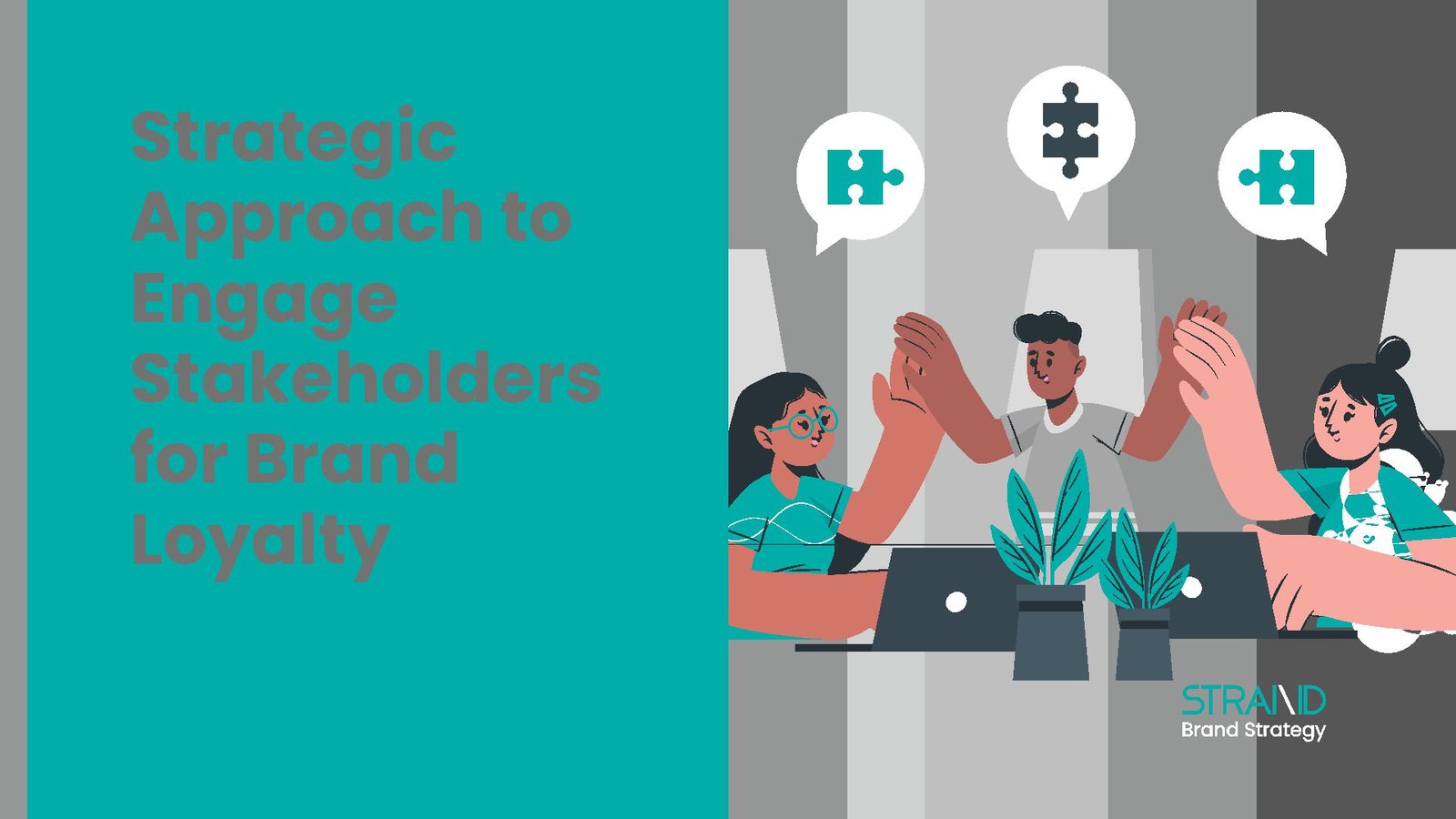Strategic Approach to Engage Stakeholders for Brand Loyalty
8 minutes | 02 Oct 2024How Stakeholder Engagement Can Drive Brand Loyalty, Trust, and Business Growth
In today’s competitive business environment, effective stakeholder engagement is essential for building brand loyalty and driving sustainable growth. Whether you’re a startup laying the foundation for your brand, a family business seeking to balance tradition and innovation, or a multinational corporation expanding globally, your success hinges on the relationships you cultivate with key stakeholders—employees, customers, investors, and partners.
At STRAND, we specialize in helping businesses transform into powerful brands using our proprietary framework, which focuses on Aspirations, Analyses, Alignment, Awareness, and Actions. Central to this transformation is stakeholder engagement, which ensures all parties are aligned and invested in the brand’s long-term success.
This article delves into the importance of stakeholder engagement, how STRAND tailors strategies to different sectors, and the benefits of a holistic, adaptable approach. You’ll also learn practical, actionable methods for building stronger, more loyal relationships with stakeholders.
The Importance of Stakeholder Engagement in Brand Building
Stakeholder engagement involves understanding and addressing the needs and expectations of key individuals or groups that have a vested interest in your brand. This includes both internal stakeholders (employees, management, shareholders) and external ones (customers, partners, investors). In a brand context, stakeholder engagement aims to create a cohesive, aligned narrative that resonates with all involved parties, fostering loyalty, trust, and long-term relationships.
- Increased Focus on Corporate Social Responsibility (CSR):
Modern consumers and investors are more concerned with how brands engage with social and environmental issues. A 2022 study by Edelman found that 64% of consumers worldwide are belief-driven buyers, meaning they will choose or avoid brands based on their stand on societal issues. - Employee Advocacy as a Key Driver:
According to LinkedIn’s Workplace Learning Report (2021), companies with highly engaged employees are 21% more profitable. Employee advocacy programs, where workers actively promote their company’s brand, are on the rise. - Rise of Personalized Customer Engagement:
A Salesforce study revealed that 84% of customers consider the experience a company provides as important as its products or services. Personalizing customer engagement has become vital for maintaining brand loyalty and differentiation in crowded markets.
Effective stakeholder engagement impacts brand loyalty and trust at multiple levels. Internally, engaged employees become brand advocates who can drive growth and innovation. Externally, satisfied customers and partners are more likely to remain loyal and promote your brand. Investors also look for companies that show long-term potential through strong stakeholder relationships, making stakeholder engagement a key aspect of financial success.
Examples:
- Patagonia: Patagonia’s commitment to environmental sustainability has engaged both customers and employees, turning them into advocates. Their “Worn Wear” initiative, which encourages customers to repair or reuse gear, has built a loyal, value-driven community around the brand.
- Tesla: Tesla’s strong alignment with both its employees and customers, particularly around its mission to accelerate the world’s transition to sustainable energy, has led to an almost cult-like brand loyalty, making it a leader in the electric vehicle space.
Tailoring Stakeholder Engagement for Different Sectors
Stakeholder engagement strategies must adapt to the unique needs and dynamics of different sectors and business stages. For startups, building initial trust and awareness is critical. MSMEs may need to focus on scaling relationships, while Indian multinational corporations (IMNCs) often juggle diverse stakeholder needs across global markets.
- Startups:
For startups, the focus is on building credibility and loyalty in the early stages. Stakeholder engagement should revolve around creating a strong brand foundation, connecting emotionally with early customers, and maintaining transparent, mission-driven communication with investors. Startups often succeed by positioning themselves as disruptors with a clear, compelling purpose. - MSMEs (Micro, Small, and Medium Enterprises):
MSMEs need to focus on scaling engagement as they grow. This means transitioning from founder-led customer relationships to structured, scalable stakeholder engagement strategies. MSMEs should ensure that their brand values remain intact as they expand, engaging employees and customers with consistent, clear messaging. - IMNCs (Indian Multinational Corporations):
For IMNCs, stakeholder engagement requires managing diverse, often complex relationships across regions and cultures. IMNCs must craft global brand strategies that resonate locally, ensuring consistent messaging while adapting to local nuances. This might include engaging local communities, regulatory bodies, and global talent in different ways, depending on the market.
Challenges/Opportunities:
- Startups face trust and credibility gaps:
As new entrants, startups must overcome skepticism from customers and investors alike. Building strong relationships through authentic storytelling and transparent communication can turn early adopters into advocates. The opportunity lies in their agility—they can quickly adapt based on stakeholder feedback. - MSMEs must manage scalability:
Scaling presents the challenge of maintaining a personal touch in stakeholder relationships. MSMEs need systems that allow them to scale without diluting their brand’s message. This presents an opportunity to create frameworks for sustainable engagement as they grow. - IMNCs face cultural complexity:
Indian multinational corporations must navigate diverse regulatory, cultural, and social environments. The challenge lies in maintaining a global brand identity while adapting to local markets. The opportunity is in establishing themselves as global players, engaging a wider array of stakeholders through targeted regional strategies.
Stakeholder Impact:
- Startups: For startups, investor confidence, early customer feedback, and employee loyalty can make or break their business. Early engagement efforts should prioritize these stakeholders.
- MSMEs: MSMEs benefit from strong customer and partner relationships, which are crucial as they scale. Investors are also more likely to back businesses that demonstrate consistent stakeholder engagement.
- IMNCs: For IMNCs, managing relationships with regional stakeholders—including local governments, communities, and talent—while maintaining a global brand presence is crucial to long-term success.
STRAND’s Solutions for Effective Stakeholder Engagement
At STRAND, our approach to stakeholder engagement is anchored in our 5A Framework, ensuring that all strategies are aligned with the brand’s long-term aspirations and goals. Here’s how we tailor stakeholder engagement for different sectors:
- Messaging: Crafting clear, purpose-driven messages that resonate with stakeholders across different touchpoints is key. For startups, this might involve storytelling around innovation and disruption. For MSMEs, the focus might be on reliability and growth. IMNCs need to balance global messaging with local cultural relevance.
- Modulation: Customizing the way we communicate with different stakeholder groups is vital. Employees require consistent internal branding and alignment, while investors need transparent, data-backed insights. Customers and partners need personalized, value-driven communication.
- Mythos: Every brand has a story. At STRAND, we help businesses articulate and amplify their brand’s mythos—its foundational story that defines its purpose and mission. This is crucial for connecting emotionally with both internal and external stakeholders.
- Marketing: Integrated marketing campaigns that are designed with stakeholders in mind ensure consistent engagement. We emphasize the importance of a multi-channel approach that speaks to customers, employees, and investors simultaneously, while maintaining a coherent brand narrative.
- Media: Choosing the right media platforms for stakeholder engagement is critical. From social media for customers to investor briefings, employee newsletters, and partner forums, STRAND helps clients navigate the media landscape strategically.
Case Studies:
- Startup Success: STRAND helped an emerging tech startup craft its initial brand messaging, focusing on purpose-driven engagement with early adopters. Through consistent communication and clear articulation of their vision, they built a loyal customer base and attracted investors during their second funding round.
- Scaling MSME Growth: An MSME client sought to expand their operations while maintaining strong relationships with existing customers. STRAND developed a customer engagement plan that included loyalty programs, regular touchpoints, and enhanced partner communication, leading to a 30% increase in customer retention over two years.
- Global Expansion for MNC: For an multinational corporation entering new markets in Southeast Asia, STRAND crafted a regional stakeholder engagement strategy. By adapting the company’s global brand identity to fit local cultural expectations, we helped them navigate regulatory challenges and engage local communities, resulting in successful market entry.
As businesses become more global and interconnected, the need for effective stakeholder engagement will only intensify. Brands that can adapt their strategies to different audiences, while maintaining a consistent core identity, will be better positioned to thrive. STRAND’s holistic approach ensures that companies of all sizes can build strong, resilient brands by engaging the people who matter most.
Final Thoughts: Stakeholder Engagement for Winning Brands
Stakeholder engagement is critical for building brand loyalty, trust, and long-term success. By understanding and addressing the unique needs of different stakeholder groups—whether they are employees, customers, investors, or partners—businesses can foster stronger relationships that drive growth.
Effective engagement isn’t just about external brand awareness; it involves creating alignment and cohesion within the brand, ensuring that all stakeholders are on board with the company’s mission and vision. STRAND’s expertise in stakeholder engagement helps clients tailor their approach for maximum impact, regardless of industry or size.
As stakeholder expectations evolve, brands must continue to innovate in how they engage with their audience. The future belongs to companies that can build deep, meaningful connections with both internal and external stakeholders, driving long-term success and becoming winning brands.

